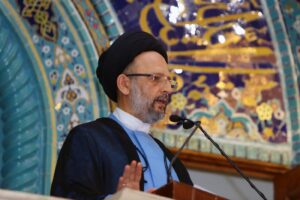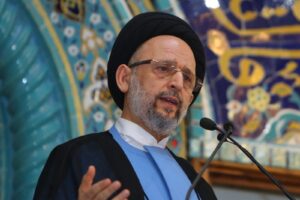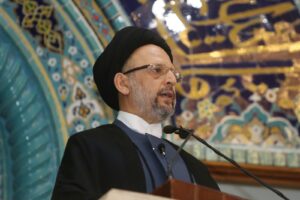The positive aspects of sickness
The first Sermon
Allah says in His Glorious Book: And We will surely test you with something of fear and hunger and a loss of wealth and lives and fruits, but give good tidings to the patient. Allah, the Most Exalted, speaks the truth.
It might be natural for man to view sickness as something negative, for it is accompanied with pain and suffering and it might also lead to death. Nevertheless, the Quranic verses and the Honorable Hadiths wanted us to have a different view of getting sick. Even if a
part of it is pain and sufferings, it carries with it some good, gifts and blessings… If the sick person becomes aware of them, they will help him to endure and overcome the accompanying pain and sufferings. The Hadith says: No Muslim is afflicted with any harm but that Allah will remove his sins as the leaves of a tree fall down.
Let us also cite this Hadith that shows Allah’s love and mercy towards His worshippers:
No fatigue, nor disease, nor sorrow, nor sadness, nor hurt, nor distress befalls a Muslim, even if it were the prick he receives from a thorn, but that Allah expiates some of his sins for that.” This love and mercy is even more abundant, when the sick hides his aches so that he would not disturb others. Allah has given glad tidings to the patient when He said: give good tidings to the patient, who, when disaster strikes them, say, “Indeed we belong to Allah, and indeed to Him we will return. Those are the ones upon whom are blessings from their Lord and mercy. And it is those who are the [rightly] guided. The Hadith says: Four are of the treasures of Paradise: concealing calamity, concealing charity, concealing misfortune, and concealing pain.
The second positive effect of sickness is that it leads to man’s return to Allah and strengthens the ties with Him. Many people do not communicate with Allah or think about Him, until they get sick. They will then turn back to Allah and ask for His forgiveness and help.
The third positive effect is removing the arrogance that might inflict man when he is healthy. Sickness brings back man’s modesty by telling him that no matter how high a position or a status he might reach, a virus or a microbe is able to turn his life up side down.
The fourth positive effect is that sickness makes man rethink how he deals with his health that he might have neglected and did not consider it, as Allah commanded, one of his priorities…That is why we find that he cares more when he gets sick about his hygiene and the quality of his food and drink and tries to stay away from everything that might harm his health.
The fifth positive effect is represented by that sickness, being one of the indicators of death, is a warning for man that calls on him to be prepared to meet God, and repent from his sins and deviation.
The positive effect of sickness is not limited to the sick. It extends to those who visit him. The Hadith Qudsi says: Allah will say on the Day of Judgment, ‘Son of Adam, I was sick but you did not visit Me.’
‘My Lord, how could I visit You when You are the Lord of the Worlds?’
‘Did you not know that one of My servants was sick and you didn’t visit him? If you had visited him, you would have found Me there.’ Another Hadith says: No Muslim visits another sick Muslim in the morning but that seventy thousand angels will bless him until the evening. He does not visit him in the evening but that seventy thousand angels will bless him until the morning, and he will reap the fruits of Paradise.
However, talking about the positive aspects of sickness does not mean, as some might believe, that we call on man to die…It is the duty of man to seek to preserve his health. It is religiously impermissible to neglect it and not perform one’s duties towards his health. That is why the Messenger used to pray: My Lord, I ask you for pardon and wellness in this world…
Nevertheless, sickness is one of the norms of God. No one, not even the prophets and the righteous servants, has been exempted from it. If one becomes sick, he should seek to recover and try not to get sick again:
That is why Imam Sajjad says in his Dua for sickness:
O God, to You belongs praise for the good health of my body which lets me move about,
and to You belongs praise, for the ailments which You cause to arise in my flesh!
For I know not, my God, which of the two states deserves more my thanking You
and which of the two times is more worthy for my praise of You:
the time of health, within which You make me delight in the agreeable things of Your provision,
through which You give me the joy to seek the means to Your good pleasure and bounty,
.and by which You strengthen me for the acts of obedience which You have given me success to accomplish;
or the time of illness through which You put me to the test and bestow upon me favors:
lightening of the offenses that weigh down my back,
purification of the evil deeds into which I have plunged,
incitement to reach for repentance, reminder of the erasure of misdeeds through ancient favor;
and, through all that, what the two writers write for me:
blameless acts, which no heart had thought,
no tongue had uttered, and no limb had undertaken, rather, as Your bestowal of bounty upon me
and the beneficence of Your benefaction toward me.
O God, bless Muhammad and his Household,
make me love what You have approved for me,
make easy for me what You have sent down upon me,
purify me of the defilement of what I have sent ahead,
erase the evil of what I have done beforehand,
let me find the sweetness of well-being, let me taste the coolness of safety.
Dear loved ones:
The significance of trial lies in that it underscores the essence of man. That is why the Hadith says: Wonderful are the affairs of the believer; for there is good in each of his affairs. This is not the case with anyone else except the believer, for if he suffers affliction, he endures patiently, which is good for him. If he has an occasion to feel delight, he thanks (Allah), thus there is good for him in it.” We ask Allah to let us be among the thankful and patient when we are afflicted.
The second sermon
Worshippers of Allah, The Most Exalted, I advise you and myself with what The Messenger advised his daughter, Fatima Az-Zahraa, whose death anniversary is on the third of this month. She says; ‘My father the Messenger of Allah entered when I had gone to bed to sleep, and said: O Fatimah! Do not go to sleep before doing four things: reciting the whole of the Qur’an, making the Prophets your mediators (with Allah), making the believers satisfied with you and performing the pilgrimage and visit (hajj and ‘umrah to Makkah). Then he started praying! So, I stayed in bed until he finished the prayer and said: O Messenger of Allah! You ordered me to do four things which I could not do in this hour! The Messenger of Allah smiled and said: If you recite the Tauheed chapter (al-Ikhlas surah) three times it is as if you have recited the whole of the Qur’an; and if you recite prayers to me and the prophets before me then we shall be your mediators in the Day of Judgment; and if you pray that Allah forgive the believers (say istighfar) they shall be satisfied with you; and if you say: Subhan Allah (praise be to Allah) and al-Hamdu Lillah (gratitude to Allah) and La Ilaha Illa Allah (there is no God but Allah) and Allahu Akbar (God is greatest) as if you have performed the pilgrimage and visit.’ This is the advice of the Messenger to his daughter and consequently to us. And this is what we should do, before we sleep to attain Allah’s reward. And this the way we express our loyalty to Az-Zahraa, since it is not enough to express our grief for her, we should also take her as a role model, to become more capable of facing challenges.
As Lebanon enters another lockdown, which we hope that it will be successful, as the country can no longer bear the catastrophic consequences of the pandemic, whether with respect to the number of people infected, the number of causalities or with respect to the hospitals and the medical staff. But this success depends on how much the citizens would be committed by the lockdown measures and how much strict would the security forces be in implementing them.
We had wished that things would not have reached this stage, owing to their effects on the people’s living in these difficult times, but what happened during the holidays, and the increase in the number of those infected made this decision inevitable. Thus, we call on the Lebanese, and all those who live in Lebanon, to abide by the lockdown measures, for they are responsible for their lives and the lives of those around them. and we say to them: be patient for few days to enjoy a long time rest. At the same time, we call on the government not to expand the sphere of those exempted.
We also have to point out to the effect of the lockdown on the daily workers and call on the government, the NGOs and the rich to work together to support the poor and the unemployed in these hard times, and we would like to commend the decision of the ministry of finance in this respect and we hope that these aids will reach those who deserve them and would not be lost, as we are accustomed to, in the maze of partisan and private interests.
In the meantime, the Lebanese are anxiously waiting for the government to speedup the measures that ensure that the best vaccine will reach all the Lebanese. It should also not rely on a single source, since the number that is talked about would not be enough.
If the delay is due to the inability of the government to cover the expenses, the private sector should also take part, so that the government habitual carelessness towards the Lebanese health would not be repeated.
We should pause at the exploitation of the Lebanese markets to the need to medical and food provisions to prepare for the lockdown, to raise the prices to a level that even surpassed the raise of the price of the dollar. We are afraid that this will happen again in the lockdown period, which calls for enhancing the supervision of the ministry of economy and some humanitarianism from the merchants who exploit the need of the people without taking their suffering into consideration.
On the political level, the rows reached last week an unprecedented and even improper level, turning the formation of the government the Lebanese are waiting for to take them out of the dark tunnel more complicated and difficult to the extent that it has become a national crisis and not only one of forming a government.
Faced by this reality, we renew our call to the political parties to sympathize with Lebanon and its citizens whose sufferings are increasing day by day and discard their private interests and calculations and hasten to shoulder their responsibility of forming a government that is capable of ending the Lebanese sufferings. At the same time, we call on the people to end their silence which tempted the politicians to continue to turn their backs to the interests of the Lebanese, having grown assured that the people have been weakened and calmed down and returned to their sectarian and confessional bases. That is why they returned to their old- new sectarian incitation that they will not accept that their sect would be targeted, while they are far away from caring for the interests of their sects. The Lebanese have to be very conscious so as not to let these politicians incite yet again their sectarian instincts and try what they have previously tried several times and led the country to reach the situation it now finds itself in.
Lastly, we have to point out to the continuous violations of the enemy to the Lebanese air space and sovereignty which coincide with the escalation in Syria and could, we are afraid, spread in the region. The Lebanese should be aware of this escalation and face it by their unity, which is the strongest weapon we possess against an enemy that only understands the language of force.





